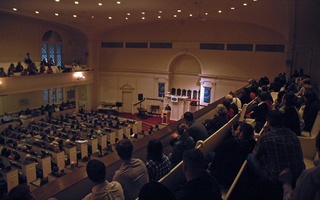If someone told me during my cadet years at West Point that I would fall in love with Harvard and have warm friendship and regard for its current students, it would have been amazing data to process. For one thing, it would have meant that I would make it through Vietnam, a pretty good—and certainly not guaranteed—outcome.
In retrospect, however, it is not surprising that the chapters of my life when I was a soldier and when I attended Harvard Business School are connected. Harvard, after all, has always played an instrumental role in protecting this nation.
Soldiers have historically been considered to be highly valued students for the University’s investment. President Nathan M. Pusey ’28 personally saw to it that the name of an applicant from the war zone got “sent to the right quarters,” so that Bruns Grayson ’74 became the only Rhodes Scholar who served in Vietnam before college.
When I had the signal opportunity to chair construction of the Vietnam Memorial in Washington D.C., Harvard graduates ensured that amidst the huge ten-year controversy its construction continued without fail. Each Harvard alumnus who participated gave hundreds of hours of devotion and time. The Atlantic Monthly Editor James M. Fallows ’70, a former President of The Harvard Crimson, in two hours wrote and placed an op-ed in the Washington Post to blow the whistle on an egregious move by opponents of the design. People with connections to Harvard were numerous among those who made the wall possible.
Harvard’s professors also contribute to our armed forces in a decisive way. In defense lanes, I found myself working with Professor Matthew S. Meselson; it is little known that his work led directly to the still-standing U.S. policy to forego all use of biological weapons. He still works devotedly as teacher, scientist, and friend to public servants. Samuel R. Williamson parsed foreign policy and the causes of war for us rookies in the Pentagon. He still does.
Though historically rooted, the ties between Harvard and our nation’s armed forces have been called into question lately, given the University’s 42 years of insistence that the Reserve Officer Training Corps cannot have a place on campus. I believe that Crimson editorial writer Brian J. Buldoc ’10’s opinion piece supporting lifting the ban spots the main obstacle: among faculty members, antipathy for the military is concomitant to the ban. In talks with Harvard students and graduates in last winter, I found that the majority favor lifting the ban on ROTC; they, and I, feel that the ban makes a negative statement about those in the military now, stigmatizing young officers for the sake of trying to combat the stigma that faces gay military personnel.
I find that among gay military personnel there is little or no desire to injure fellow military. The view is that the case is for Congress to decide and is not the fault of young people who are either currently in the military or are committed to join after college. When Harvard refuses to allow ROTC on campus, it sends the message that service to one’s country is not a priority. At its core, Harvard’s ban “blames the warrior” for a policy issue. That is the same mistake the ban originally made in 1968, when ROTC was removed from campus as the result of protests against the war in Vietnam. Among those of us in the military on campus then, there was a sting of personal rejection that is still felt by ROTC candidates now.
But our country has moved beyond “blaming the soldier” for issues of policy. Our country needs the best that Harvard has to offer in a new century of grave threats. Our country needs the Harvard of Elliot L. Richardson ’41, Oliver Wendell Holmes Jr., class of 1861, and Robert Gould Shaw.
Commencement and the coming weeks are a fitting time to join with President Obama, to speak and act to end the ban on ROTC, and to affirm the message to all students and to our country that Harvard will always stand with our military in serving the nation.
John P. Wheeler, MBA ’69, is Chairman of the American Warfighters Fund, a charity that mobilizes action to meet key unmet needs of active military, veterans, and their families. He served in Vietnam from 1969 to 1970.
Read more in Opinion
Not All Who Wander Are LostRecommended Articles
-
Activists Face Tough Registration BattleThe 25 parents who picketed against draft registration in downtown Boston yesterday had not memorized their chants. So they read
-
Remembering Radar O’Reilly: The Ratings Legacy of ‘M*A*S*H’I don’t understand football. Not that it hasn’t been explained to me—many times, in fact—but my knowledge of downs and flags and penalties is like a house of cards.
-
 20 Years Later, O’Brien Reflects
20 Years Later, O’Brien Reflects -
 Blumenthal Didn't Fight in Vietnam (But He Did Go to Harvard)
Blumenthal Didn't Fight in Vietnam (But He Did Go to Harvard) -
Crimson TideI have been at Harvard for almost three years, and, frankly, I don’t see what the fuss is about. What distinguishes Harvard and Yale from Princeton and Stanford so dramatically as to legitimize this massive disparity?
-
 Harvard Protests Through the Years
Harvard Protests Through the Years













